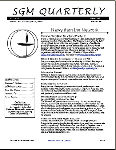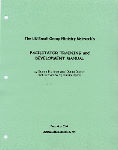(1) Why did your church start its program? What were the goals?
Main Line Unitarian Church (MLUC) began with a 'Neighborhood Circle' concept - that is, an effort to build relationship and connection among congregants who lived in geographical proximity. This concept soon yielded to the fact that time is the true measure of our lives and available hours came to determine the structure of MLUC SGM groups.
I like to go back to Rev. Stephan Papa's sermon of September 2002,* which articulates very well some of the longing and hopes for small group ministry at Main Line Unitarian Church. The church had grown larger; people struggled to maintain a sense of community and belonging. Visitors found the place hard to penetrate and dialog was needed across diverse groups and interests. The concept of small group ministry seemed to offer a new path to a more caring and connected community. At the same time, some congregants were looking for ways to deepen their personal search for meaning and expand the scope of their spiritual development. The MLUC SGM program aimed to provide a structured conversation for group members to achieve this dual purpose of deepening connection and conversation.
[*accessible at http://www.sas.upenn.edu/~leinwand/SGM2/Content/RevPapaSer9-22-02.pdf]
(2) Were those goals fulfilled?
For those individuals who participate in the groups, the reward has been high. A number of groups have maintained stable membership; others have experienced consistent change in membership. From time to time, groups have experienced problems with their group process or session procedures. In general, the problems have been resolved and served to inform the program leadership.
When carried out faithfully, the process of a SGM session - a structured conversation, including a guided subject matter and discussion, together with open personal sharing without outside comment - offers a unique experience to group members. Participants feel free to speak, and, what many express as most important, they feel "heard" and not "judged." A sustaining SGM group provides a life-affirming experience that offers many secondary benefits to the individuals involved as well as to the congregation as a whole.
(3) Were there other benefits?
Of course, we can't know if the growth and connection that has taken place within the SGM group experience would have happened outside the groups, but it is safe to say that the apparent benefits to individuals and the congregation are broad and varied. First, we can note many instances of informal lay care support activities among group members. In addition, SGM participation has helped integrate new members into the church community. In my own experience, I have seen instances of personal growth as a result of group participation - individuals who once found it difficult to stand in the coffee hour now chair committees and lead others in a variety of church activities. The group experience can offer individuals support through major life transitions such as retiring from work, taking care of aging parents, raising children, or going through a divorce, among other life events. The small groups have increased volunteer participation in the work of the church, and provided collective support for broader social action initiatives in the community and beyond.
(4) What would you say are the main reasons for having the program now, or main benefits, etc?
I believe that churches and congregations are always in some form of transition - whether due to changes in membership, funding, staffing, or outside events. The small groups at MLUC comprise one very dedicated segment of the membership of the church. This dedication to the church at the small scale results in a more consistent commitment to the church as a whole.
At MLUC, the original SGM program continues with a solid core of stable and committed small groups. Increasingly however, the program aims to expand the SGM value more broadly in and for the congregation. Specifically, this means providing a small group experience for as many new members as possible, and increasing the exposure to the small group experience more broadly in the congregation. I believe that the essential purposes of the program remain constant: to develop an enhanced sense of belonging in the community and to offer an opportunity for deeper personal exploration and growth through a structured session plan and conversation.
Editor's Note: Nancy Leinwand helped launch the Small Group Ministry program at Main Line Unitarian Church, is past program coordinator and steering team member, and has been a group facilitator since the program's inception in January 2003.









